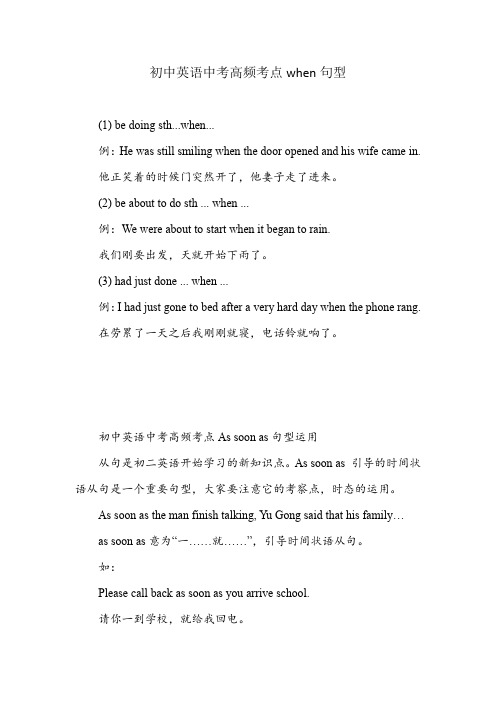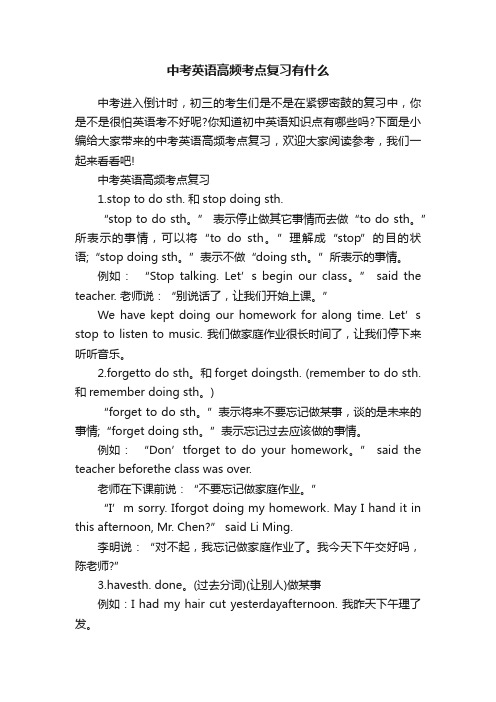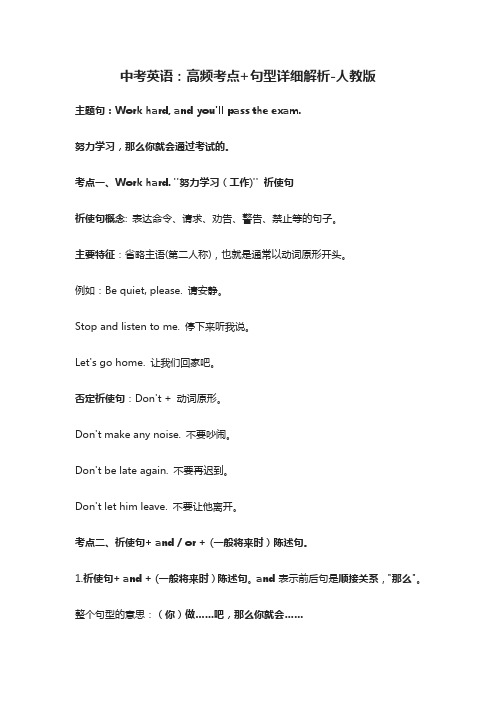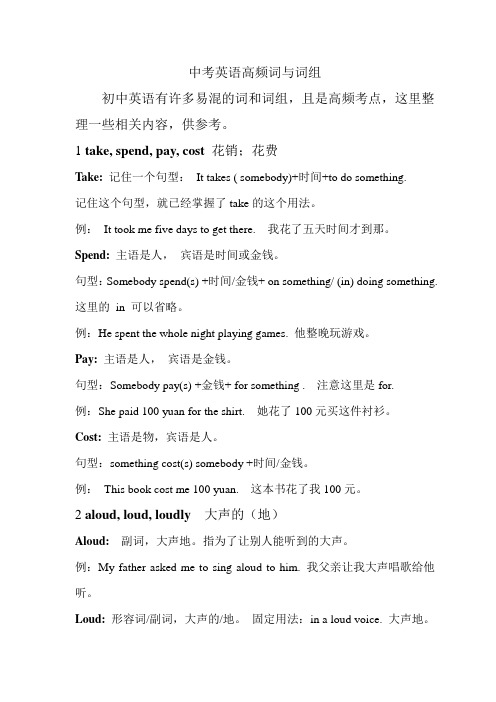中考英语【高频考点】全部句型
初中英语中考高频考点when句型

初中英语中考高频考点when句型(1) be doing sth...when...例:He was still smiling when the door opened and his wife came in.他正笑着的时候门突然开了,他妻子走了进来。
(2) be about to do sth ... when ...例:We were about to start when it began to rain.我们刚要出发,天就开始下雨了。
(3) had just done ... when ...例:I had just gone to bed after a very hard day when the phone rang.在劳累了一天之后我刚刚就寝,电话铃就响了。
初中英语中考高频考点As soon as句型运用从句是初二英语开始学习的新知识点。
As soon as 引导的时间状语从句是一个重要句型,大家要注意它的考察点,时态的运用。
As soon as the man finish talking, Y u Gong said that his family…as soon as意为“一……就……”,引导时间状语从句。
如:Please call back as soon as you arrive school.请你一到学校,就给我回电。
I’ll write to you as soon as I get there.我一到那儿就给你写信。
As soon as I went in, Tom cried out with pleasure.我一进门,汤姆就高兴的叫起来。
【拓展】as soon as 引导的时间状语从句前后时态搭配:(1) 主句为一般将来时,从句用一般现在时表示将来。
例如:SHe will come to my home as soon as she gets to tianjin. 她一到天津就来我家。
【中考英语总复习 必备知识】表达意见和建议的句型-中考英语复习必背句型(人教版)

表达意见和建议的句型一、陈述个人意见、看法的句型(1)I'm afraid...恐怕······例句①I'm afraid we can't finish it on time.恐怕我们不能按时完成.②I'm afraid I have to leave now.我恐怕现在得走了.③I'm afraid you are wrong.恐怕你错了.④There's little time left. I'm afraid we have to make a decision as soon as possible.时间所剩无几,恐怕我们得尽快作出决定了.⑤-What a strong sandstorm! Will it last long? 多么厉害的沙尘暴呀!它会持续很长时间吗?-I'm afraid so. We're getting into the sandstorm season now.恐怕是吧.我们现在已经进入沙尘暴较多的季节了.⑥-Can we be on time?我们能准时吗?-I'm afraid not.恐怕不能.(2)I think (that)...我认为······该句型用于说话者陈述自己对于某人或某事物的看法,强调的是个人主观意愿,与客观事实可能存在差异.that 是一个连接词,在句中引导宾语从句,可以省略.“I think(that)...”的否定形式为“I don't think(that)...”,意为“我认为······不”,表示主观的否定意见和看法. I think so意为“我认为如此”,I don't think so意为“我不这样认为”.例句①I think the volunteers who saved people in trouble should be regarded as heroes as well.我认为那些拯救受困人员的志愿者也应该被视为英雄.②I think(that)Tom is honest.我认为汤姆很诚实.③I think he will come to see us soon.我认为他不久就会来看我们.④I think that is a good idea.我认为那是一个不错的主意.⑤I don't think my parents will agree.我认为我的父母不会同意.⑥I don't think he will join us.我认为他不会加入我们.⑦-Are you sure you can do well in today's test, Lucy?露西,你确信你今天考试能考得不错吗?-I think so. I've got everything ready.我认为如此,我已经做好准备了.(3)I think/find/feel it+形容词+to do sth我认为/发现/感觉做某事······这一结构中,it为形式宾语,真正的宾语是后面的动词不定式.例句①I think it impolite to cut in line.我认为插队是不礼貌的.②I think it easy to make friends with Mr. White.我认为和怀特先生交朋友很容易.③I think it great to join in their party tonight.我认为今晚参加他们的聚会是非常棒的.④I find it easy to learn English well.我发现学好英语是很容易的.⑤I find it hard to teach my younger brother to paint.我发现教我弟弟画画不容易.⑥I feel it necessary to help the old.我感到帮助老人是必要的.⑦I feel it possible to finish my homework before nine o'clock.我觉得九点前完成作业是可能的.(4)I wonder...我想知道······例句①I wonder if/whether he will come.我想知道他是否会来.②I wonder if/whether the house is big enough.我想知道这房子是不是足够大.③I wonder who told him the seeret.我想知道谁把秘密告诉了他.④I wonder how James is getting on.我想知道詹姆斯的近况.⑤I wonder where he spent his childhood.我想知道他的童年是在哪里度过的.⑥I wonder which he chose at last.我想知道他最后选了哪个.(5)I hope...我希望······“I hope...”句型用来表达自己的愿望,后面可以跟动词不定式或that引导的宾语从句,that可以省略,从句的时态多用一般现在时或一般将来时.例句①I hope you have a good trip.我希望你旅途愉快.②I hope to live beside the river.我希望能住在河边.③I hope one day our dreams will come true.我希望有一天我们的梦想能够成真.④I hope you will like it.我希望你会喜欢它.(6)I feel like (doing) sth....我想(做)某事······例句①I feel like a cup of coffee.我想要一杯咖啡.②When you feel like giving up, think of your goal.当你想要放弃的时候,想想你的目标.③I feel like going to bed. I am tired.我想要去睡了.我累了.④I don't feel like going to the cinema tonight with you.我今天晚上不太想和你一起去看电影.二、征求对方意见或向对方提建议的句型(1)What do you think...?你认为······?句型“What do you think...?”用来询问对方对某事物或某人的看法或建议,表示客气且正式地征询对方意见,有时也是礼貌用语.其中do you think 在句中不充当句子的成分,置于特殊疑问词之后,其后的时态、动词的形式均不受do you think的影响.例句①What do you think is good for children?你认为什么对儿童有益处?②What do you think is the best way of reading?你认为什么是阅读的最佳方法?(2)What do you think of...?你认为······怎么样?句型“What do you think of...?”相当于“How do you like...?”或者“How do you feel about...?”,是一种交际用语,用来询问对方对某事物或某人的看法.其答语通常为表示评价的形容词(短语)或句子.例句①-What do you think of the film?=How do you like the film?=How do you feel about the film?你觉得这部电影怎么样?-I don't mind it.我不介意它.②-What do you think of this book? =How do you like this book? =How do you feel about this book?你认为这本书怎么样?-Very interesting.非常有趣.③-What do you think of his answer? =How do you like his answer?=How do you feel about his answer? 你认为他的回答怎么样?-Not bad.还不错.④-What do you think of her dress? =How do you like her dress?=How do you feel about her dress?你觉得她的连衣裙如何?-Very beautiful!非常漂亮!(3)Would you like+名词/动词不定式?你想要······吗?此句型用来向对方委婉地提出建议,would在这里不表示过去时,仅表示语气上的客气与委婉.其中“Would you like sth.?”的肯定答语为:Yes, please.;否定回答为:No, thanks.而“Would you like to do sth.?”的肯定答语为;Yes, I'd like/love to./Certainly./Sure.;否定回答一般不太直接,同时陈述一些相应理由.例句①Would you like some hot water?来点儿热水好吗?②Would you like a cup of tea?来杯茶好吗?③Would you like to say something? 你愿意说点儿什么吗?④Would you like to stay here one more day? 你要不要在这儿多待一天?⑤-Would you like some dumplings for lunch?午饭你想吃饺子吗?-No, thanks. I'm full.不,谢谢.我不饿.⑥-Would you like to go out to play basketball with me? 你愿意和我一起出去打篮球吗?-I'd love to, but I should finish my homework first.我愿意,但我应该首先完成作业.(4)Will/Would you please(not)...?请你(不)······好吗?此句型表示有礼貌的请求,句尾要用升调,回答常用“Of course./Certainly./Yes, I'll be glad to./No, I'm s orry.”等. 例句①Will you please turn on the TV?请你打开电视机好吗?②Your room looks dirty. Will you please make it clean?你的房间看上去很脏,你可不可以打扫一下?③Will you please not argue with him?你不要和他争论好吗?④Would you please tell me the truth? 你能不能告诉我实情?⑤Would you please take care of my garden while we are away?在我们离开期间,你能不能帮我们照看一下花园?⑥The TV set has been on for several hours. Would you please turn it off?电视机已经开了几个小时了.请把它关掉,好吗?⑦It is so noisy here that I can't hear what you said. Could you please say it again?这里如此吵闹以至于我不能听清楚你说的话.你可以再说一遍吗?(5)Would/Do you mind(one's) doing...? 你是否介意做······?回答该问句时,如要表示“没关系,我不在乎.”可以说:Of course not./No, not at all./No, go ahead.而表示不希望对方做此事时往往要委婉回答.如:I'm sorry, you'd better not.(对不起,你最好不要这样做.)例句①Would you mind opening the door for me?你介不介意为我开门?②Would you mind saying it again?你介意再说一遍吗?③Do you mind my smoking here? 我在这里吸烟你介意吗?④Would you mind her sitting here?你介意她坐在这儿吗?⑤Do you mind if I tell him the truth?如果我对他讲实情你介意吗?⑥Would you mind waiting outside for a moment.你介意在外面等一会儿吗?⑦Would you mind not putting up the ads on the wall? 请不要在墙上张贴广告好吗?(6)What/How about...?······怎么样?例句①What/How about a glass of juice? 来杯果汁怎么样?②What/How about Friday?周五好吗?③What/How about sending him an e-mail?给他发封电子邮件怎么样?④What about going hiking and relaxing ourselves? 去远足放松一下怎么样?⑤How about sharing your worries with your parents?与父母分享一下你的担忧怎么样?(7)Why don't you...?/Why not...?为什么不······?例句①Why don't you look this word up in the dictionary?你为什么不在词典里查一下这个单词呢?②Why don't you join an English club to practice speaking English?为什么不参加英语俱乐部来练习说英语呢?③Why not come in and sit down?何不进来坐一下?④-Why not go to Lao She Teahouse tonight?今天晚上为什么不去老舍茶馆呢?-Sounds great.听起来好极了.(8) You'd better(not) do sth.你最好(不要)做某事.例句①You'd better hurry up.你最好快一点儿.②You'd better stay at home today.你今天最好待在家里.③You'd better buy an English dictionary.你最好买一本英语词典.④You'd better not watch TV all the time.你最好不要老是看电视.⑤You'd better not ask him for help.你最好别向他求助.⑥It's rather hot in the room. You'd better not close the windows or the door.房间里相当热.你最好不要关窗户或门.。
[全]中考英语高频考点、句型详解-人教版
![[全]中考英语高频考点、句型详解-人教版](https://img.taocdn.com/s3/m/410328f7e518964bce847c9e.png)
中考英语高频考点、句型详解-人教版主题句:He accepted her invitation to the party.他接受了她的去参加聚会的邀请。
考点一、accept 和receive的用法辨析1.accept 用作动词,意为"接受",指经过考虑而主动"接受",强调个人的主观意愿。
He is very glad to accept my invitation.他非常愉快地接受了我的邀请。
I'm afraid that I can't accept your presents.恐怕我不能接受你们的礼品。
2. receive 用作动词,意为"收到、接收",通常指收到某物的客观动作,含有被动意味,不强调主观态度(接受或拒绝)。
It is better to give than to receive.给予要比接受好.I received his expensive birthday gift, but I refused to accept it politely. 我收到他送的昂贵的生日礼物,但我礼貌地拒绝了。
He wants to receive a good education at university.他想要在大学接受良好的教育。
考点二、invitation 的用法1. invitation 名词,意为"邀请;请柬",是由动词invite 转变而来的名词。
Thanks for your invitation, but I have to stay at home to look after my baby sister.感谢你的邀请,但我必须待在家里照看我的小妹妹。
I'm afraid you can't come to our party without our invitation.没有我们的邀请,恐怕你不能参加我们的聚会。
中考英语作文亮点句式+万能句型

【作文亮点句型】一、the + est + 名词 +(that)+ 主词 + have ever + seen (known/heard/had/read, etc)~~~ the most + 形容词+ 名词+(that)+ 主词+ have ever + seen(known/heard/had/read, etc)例句:Helen is the most beautiful girl that I have ever seen。
海伦是我所看过最美丽的女孩。
二、Nothing is + er than to + VNothing is + more + 形容词 + than to + V例句:Nothing is more important than to receive education。
没有比接受教育更重要的事。
三、cannot emphasize the importance of ~~~ too much(再怎么强调.。
的重要性也不为过。
)例句:We cannot emphasize the importance of protecting our eyes too much。
我们再怎么强调保护眼睛的重要性也不为过。
四、There is no denying that + S + V .。
(不可否认的……)例句:There is no denying that the qualities of our living have gone from bad to worse。
不可否认的,我们的生活品质已经每况愈下。
五、It is universally acknowledged that + 句子~~ (全世界都知道……)例句:It is universally acknowledged that trees are indispensable to us。
全世界都知道树木对我们是不可或缺的。
【精品】中考英语作文好词好句积累

中考英语作文好词好句积累------------------------------------------作者------------------------------------------日期中考英语作文好词好句积累(描写人物篇)一、外貌体形(一)常用句型:①主语+ be + adj/n.. 例如:She is of medium height. 她中等身材。
②主语+ be + a + adj. + man / woman / girl / boy. 例如:He is a grey-haired thin old man. 他是一位白发苍苍的瘦老头。
③某人 + has + adj. + 身体部位。
例如:She has a round face and wide eyes. 她长着圆圆的脸,大大的眼睛。
(二)常用词语:①表“长相”常用词语:good-looking 长得好看的,ugly-looking 长得难看的, ordinary-looking长相一般的, funny-looking 长相滑稽的,white-haired白头发的,beautiful 漂亮的,pretty 漂亮的,handsome (男子)英俊的,漂亮的,broad shoulder宽肩膀,wide eyes大眼睛,wide mouth大嘴巴。
②表“体形”常用词语:tall高的, short矮的,be of medium height中等身材,be short in stature身材矮小,fat胖的, thin瘦的, slim苗条的,full-bodied魁梧的。
常用描写人物的形容词:determined (有毅力的)competent 有能力的warm - hearted (热心肠的easy - going (温和宽容的)energetic(精力充沛)generous(慷慨的)intelligent(精明的)ambitious(雄心的)forgetful(健忘的)honest (诚实的)humorous (幽默的)independent (独立的)diligent (勤奋的)cautious (谨慎的)talkative (多话的)healthy (健康的)attractive (有吸引力的)patient (耐心的)strict (严格的)modest(谦虚的)considerate(考虑周到的) outstanding (杰出的)optimistic(乐观的)enthusiastic(热情的)二、身高体重(一)表“身高”的句型:①主语 + be + 数词 + 单位 + tall.②主语 + be + 数词 + 单位 + in height. 例如:He is 1.72 metres tall/in height. 他身高一米七二。
中考英语高频考点复习有什么

中考英语高频考点复习有什么中考进入倒计时,初三的考生们是不是在紧锣密鼓的复习中,你是不是很怕英语考不好呢?你知道初中英语知识点有哪些吗?下面是小编给大家带来的中考英语高频考点复习,欢迎大家阅读参考,我们一起来看看吧!中考英语高频考点复习1.stop to do sth. 和stop doing sth.“stop to do sth。
” 表示停止做其它事情而去做“to do sth。
”所表示的事情,可以将“to do sth。
”理解成“stop”的目的状语;“stop doing sth。
”表示不做“doing sth。
”所表示的事情。
例如:“Stop talking. Let’s begin our class。
” said the teacher. 老师说:“别说话了,让我们开始上课。
”We have kept doing our homework for along time. Let’s stop to listen to music. 我们做家庭作业很长时间了,让我们停下来听听音乐。
2.forgetto do sth。
和forget doingsth. (remember to do sth. 和remember doing sth。
)“forget to do sth。
”表示将来不要忘记做某事,谈的是未来的事情;“forget doing sth。
”表示忘记过去应该做的事情。
例如:“Don’tforget to do your homework。
” said the teacher beforethe class was over.老师在下课前说:“不要忘记做家庭作业。
”“I’m sorry. Iforgot doing my homework. May I hand it in this afternoon, Mr. Chen?” said Li Ming.李明说:“对不起,我忘记做家庭作业了。
(全)2021中考英语:高频考点+句型详细解析-人教版

中考英语:高频考点+句型详细解析-人教版主题句:Work hard, and you'll pass the exam.努力学习,那么你就会通过考试的。
考点一、Work hard. "努力学习(工作)" 祈使句祈使句概念: 表达命令、请求、劝告、警告、禁止等的句子。
主要特征:省略主语(第二人称),也就是通常以动词原形开头。
例如:Be quiet, please. 请安静。
Stop and listen to me. 停下来听我说。
Let's go home. 让我们回家吧。
否定祈使句:Don't + 动词原形。
Don't make any noise. 不要吵闹。
Don't be late again. 不要再迟到。
Don't let him leave. 不要让他离开。
考点二、祈使句+ and / or + (一般将来时)陈述句。
1.祈使句+ and + (一般将来时)陈述句。
and表示前后句是顺接关系,"那么"。
整个句型的意思:(你)做……吧,那么你就会……Keep doing sports, and you'll get healthier. 坚持做运动,那么你就会身体好起来。
Get up early, and you'll catch the early bus. 早点起床,那么你就会赶上早班车。
2. 祈使句+ or + (一般将来时)陈述句。
or表示前后句是转折关系,"否则的话"整个句型的意思是:(你)做……吧,否则的话你就会……Work hard, or you won't pass the exam. 努力学习吧,否则你不会通过考试的。
Be careful, or you will make more mistakes. 仔细些,否则你会犯更多错误的。
中考英语几个高频词及词组

中考英语高频词与词组初中英语有许多易混的词和词组,且是高频考点,这里整理一些相关内容,供参考。
1 take, spend, pay, cost 花销;花费Take:记住一个句型:It takes ( somebody)+时间+to do something.记住这个句型,就已经掌握了take的这个用法。
例:It took me five days to get there. 我花了五天时间才到那。
Spend: 主语是人,宾语是时间或金钱。
句型:Somebody spend(s) +时间/金钱+ on something/ (in) doing something. 这里的in 可以省略。
例:He spent the whole night playing games. 他整晚玩游戏。
Pay:主语是人,宾语是金钱。
句型:Somebody pay(s) +金钱+ for something . 注意这里是for.例:She paid 100 yuan for the shirt. 她花了100元买这件衬衫。
Cost:主语是物,宾语是人。
句型:something cost(s) somebody +时间/金钱。
例:This book cost me 100 yuan. 这本书花了我100元。
2 aloud, loud, loudly 大声的(地)Aloud:副词,大声地。
指为了让别人能听到的大声。
例:My father asked me to sing aloud to him. 我父亲让我大声唱歌给他听。
Loud:形容词/副词,大声的/地。
固定用法:in a loud voice. 大声地。
常用法:loud enough, as loud as , too loud, so loud, very loud.例:Don’t play the radio so loud. 收音机别放那么大的声音!Loudly:喧闹地,大声地。
- 1、下载文档前请自行甄别文档内容的完整性,平台不提供额外的编辑、内容补充、找答案等附加服务。
- 2、"仅部分预览"的文档,不可在线预览部分如存在完整性等问题,可反馈申请退款(可完整预览的文档不适用该条件!)。
- 3、如文档侵犯您的权益,请联系客服反馈,我们会尽快为您处理(人工客服工作时间:9:00-18:30)。
中考英语【高频考点】全部句型句型包含词汇、短语、固定搭配和语法等全方位的知识点,因此,它在中考中的重要性是不言而喻的!1、as…as和……一样中间必须用形容词或副词原级。
例如:This classroom is as big as that one.这间教室和那间一样大。
He runs as fast as Tom.他和汤姆跑的一样快。
否定结构:not as/so…as,“不如……”。
上面的两个句子可分别改为:This classroom is not as/so large as that one.这间教室不如那间大。
He doesn’t run as/so fast as Tom.他跑得不如汤姆快。
2、as soon as一……就……用来引导时间状语从句。
若主句是一般将来时,从句要用一般现在时。
例如:I’ll tell him the plan as soon as I see him.我一看到他就告诉他这个计划。
He’ll go home as soon as he finishes his work.他一完成工作就回家。
3、be busy/enjoy/hate/go on/finish doing sth.忙于/喜欢/讨厌/继续/完成做某事在enjoy,finish,hate,go on,be busy等词语后,一般用动词-ing形式作宾语。
例如:Lin Tao is busy making a model plane.林涛正忙着做飞机模型。
My mother enjoys taking a walk after supper.我妈妈喜欢晚饭后散步。
I hate watching Channel Five.我讨厌看五频道。
When someone asked him to have a rest,he just went on working.当有人让他休息一会儿时,他仍继续工作。
I have finished writing the story.我已经写完了故事。
4、fill…with用……装满......;be filled with充满了……;be full of充满了......①be filled with说明由外界事物造成的此种状态,表示被动。
例如:The box is filled with food.盒子里装满了食物。
②be full of说明主语处于的状态。
此外,还可表示程度,意为“非常”。
例如:The patient’s room is full of flowers.那个病人的房间摆满了花。
The young man is full of pride.那个年轻人非常骄傲。
③这两种结构还可以相互改写。
例如:I fill the box with food.The box is full of food.5、be good/bad for有利于/有害于……此句型是:be+adj.+for+n.结构。
例如:Doing morning exercises is good for your health.做早操对你的健康有益。
Always playing computer games is bad for your study.总玩电脑游戏对你的学习不利。
6、be used to(doing)sth.习惯于……后必须接名词或动名词,可用于现在、过去、将来的多种时态。
be可用get,become来代替。
例如:He is used to life in the country.(He is used to living in the country.)他习惯于乡村生活。
He will get used to getting up early.他将会习惯于早起。
注意:be used to do的意思是“被用来做……”。
例如:Wood is used to make paper.木材被用来造纸。
7、both…and…两者都……用来连接两个并列成分;当连接两个并列主语时,其后谓语动词用复数。
例如:Both the students and the teachers will go to the History Museum tomorrow.不论老师还是学生明天都会去历史博物馆。
8、can’t help doing sth.禁不住做某事help在此的意思是“抑制,忍住”,其后接动词-ing形式。
例如:His joke is too funny.We can’t help laughing.他的笑话太有趣了,我们禁不止笑了起来。
9、sth.costs sb.some money某物花费某人多少钱此句型的主语是物。
cost一词带的是双宾语,它的过去式、过去分词和原型一样。
This book cost me five yuan.这本书花了我五元钱。
10、either…or…不是……就是……,或者……或者……用来连接两个并列成分,当连接并列主语时,谓语动词与邻近的主语保持一致。
You may either stay here or go home.你可以呆在这儿,也可以回家。
Either she or I am right.=Either I or she is right.不是她对就是我对。
11、enough(for sb.)to do sth.足够……做……在此结构中,for用来引出不定式的逻辑主语。
例如:The ice isn’t thick enough for you to walk on.这冰还没有厚到你可以在上面走的程度。
12、feel like doing sth.想要做……此处like为介词,后面跟动词-ing形式。
此句型与would like to do sth.同义。
例如:I feel like drinking a cup of milk.我想喝一杯牛奶。
13、feel/find/think it adj./n.to do sth.认为某事……在此结构中it为形式宾语,不定式短语作真正的宾语。
例如:I find it very interesting to play football.我发现踢足球很有趣。
She thinks it her duty to help us.她认为帮助我们是她的职责。
14、get ready for sth./to do sth.get ready for sth.意为“为某事做准备”;get ready to do sth.意为“准备做某事”例如:We are getting ready for the meeting.我们正在为会议做准备。
They were getting ready to have a sports meet at that moment.他们那时正准备开运动会。
15、get/receive/have a letter from收到……的来信相当于hear from例如:Did you receive a letter from John?你收到约翰的来信了吗?I got a letter from my brother yesterday.我昨天收到了我弟弟的一封来信。
16、had better(not)do sth.最好(别)做某事had better为情态动词,其后需用动词原形。
had better常用缩写,变成’d better,其否定形式是在其后直接加not。
例如:We had better go now.=We’d better go now.我们最好现在走吧。
You’d better not go out because it is windy.今天刮风,你最好别出去了。
17、have sth.done使(某事)完成(动作由别人完成)sth.为宾语,done为过去分词作补语。
例如:We had the machine repaired.我们请人把机器修好了。
注意区分:We have repaired the machine.我们(自己)已经修好了机器。
18、help sb.(to)do sth./with sth.帮助某人(做)某事其中的to可以省略。
例如:I often help my mother with housework.我常常帮助妈妈做家务。
Would you please help me(to)look up these words?请你帮助我查查这些词好吗?19、How do you like……?你认为……怎么样?与what do you think of…?同义。
例如:How do you like the weather in Beijing?你认为北京的天气怎么样?你觉得这部新电影如何?20、I don’t think/believe that…我认我/相信……不……其中的not是对宾语从句进行否定而不是对主句否定(否定前移)。
that可省略。
例如:I don’t think it will rain.我认为天不会下雨。
I don’t believe the girl will come.我相信那女孩不会来了。
21、It happens that…碰巧……相当于happen to do。
例如:It happened that I heard their secret.可改写为:I happened to hear their secret.我碰巧听到了他们的秘密。
22、It’s/has been+一段时间+since从句自从某时起做某件事情已经一段时间了该句型中since引导的时间状语从句常用一般过去时。
例如:It’s twenty years since he came here.他来这里已经20年了。
It has been six years since he married Mary.他和玛丽结婚已经六年了。
23、It is+adj./n.+for sb.to do sth.做某事对某人来说……It是形式主语,真正的主语是不定式to do sth。
例如:It’s not easy for us to study English well.对我们来说学好英语并不容易。
It’s a good idea for us to travel to the south.去南方旅行对我们来说是个好主意。
24、It’s+adj.+of sb.to do sth.It是形式主语,to do sth.是真正的主语,当表语(即形容词)能对逻辑主语描述时,常用介词of,而不用for。
例如:It’s very polite of you to give your seat to old people.你给老人让座,非常有礼貌。
